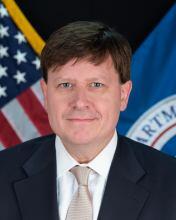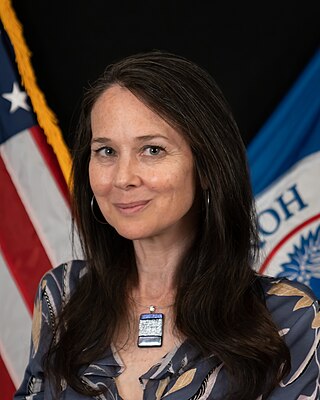
The United States Department of Homeland Security (DHS) is the U.S. federal executive department responsible for public security, roughly comparable to the interior or home ministries of other countries. Its stated missions involve anti-terrorism, border security, immigration and customs, cyber security, and disaster prevention and management.
The United States Computer Emergency Readiness Team (US-CERT) is an organization within the Department of Homeland Security’s (DHS) Cybersecurity and Infrastructure Security Agency (CISA). Specifically, US-CERT is a branch of the Office of Cybersecurity and Communications' (CS&C) National Cybersecurity and Communications Integration Center (NCCIC).

The National Cyber Security Division (NCSD) is a division of the Office of Cyber Security & Communications, within the United States Department of Homeland Security's Cybersecurity and Infrastructure Security Agency. Formed from the Critical Infrastructure Assurance Office, the National Infrastructure Protection Center, the Federal Computer Incident Response Center, and the National Communications System, NCSD opened on June 6, 2003. The NCSD mission is to collaborate with the private sector, government, military, and intelligence stakeholders to conduct risk assessments and mitigate vulnerabilities and threats to information technology assets and activities affecting the operation of the civilian government and private sector critical cyber infrastructures. NCSD also provides cyber threat and vulnerability analysis, early warning, and incident response assistance for public and private sector constituents. NCSD carries out the majority of DHS’ responsibilities under the Comprehensive National Cybersecurity Initiative. The FY 2011 budget request for NCSD is $378.744 million and includes 342 federal positions. The current director of the NCSD is John Streufert, former chief information security officer (CISO) for the United States Department of State, who assumed the position in January 2012.

Jeff Moss, also known as Dark Tangent, is an American hacker, computer and internet security expert who founded the Black Hat and DEF CON computer security conferences.
The EINSTEIN System is a network intrusion detection and prevention system that monitors the networks of US federal government departments and agencies. The system is developed and managed by the Cybersecurity and Infrastructure Security Agency in the United States Department of Homeland Security (DHS).

The Director of the Cybersecurity and Infrastructure Security Agency is a high level civilian official in the United States Department of Homeland Security. The Director, as head of Cybersecurity and Infrastructure Security Agency at DHS, is the principal staff assistant and adviser to both the Secretary of Homeland Security and the Deputy Secretary of Homeland Security for all DHS programs designed to reduce the nation's risk to terrorism and natural disasters. The Director is appointed from civilian life by the President with the consent of the Senate to serve at the pleasure of the President.
National Cyber Security Awareness Month (NCSAM) is observed in October in the United States of America. Started by the National Cyber Security Division within the Department of Homeland Security and the nonprofit National Cyber Security Alliance, the month raises awareness about the importance of cybersecurity.

The Cyber Security Division (CSD) is a division of the Science and Technology Directorate (S&T Directorate) of the United States Department of Homeland Security (DHS). Within the Homeland Security Advanced Research Projects Agency, CSD develops technologies to enhance the security and resilience of the United States' critical information infrastructure from acts of terrorism. S&T supports DHS component operational and critical infrastructure protections, including the finance, energy, and public utility sectors, as well as the first responder community.

The National Cybersecurity and Critical Infrastructure Protection Act of 2013 is a bill that would amend the Homeland Security Act of 2002 to require the Secretary of the Department of Homeland Security (DHS) to conduct cybersecurity activities on behalf of the federal government and would codify the role of DHS in preventing and responding to cybersecurity incidents involving the Information Technology (IT) systems of federal civilian agencies and critical infrastructure in the United States.

The Cybersecurity Information Sharing Act is a United States federal law designed to "improve cybersecurity in the United States through enhanced sharing of information about cybersecurity threats, and for other purposes". The law allows the sharing of Internet traffic information between the U.S. government and technology and manufacturing companies. The bill was introduced in the U.S. Senate on July 10, 2014, and passed in the Senate on October 27, 2015. Opponents question CISA's value, believing it will move responsibility from private businesses to the government, thereby increasing vulnerability of personal private information, as well as dispersing personal private information across seven government agencies, including the NSA and local police.
The Center for Internet Security (CIS) is a US 501(c)(3) nonprofit organization, formed in October 2000. Its mission statement professes that the function of CIS is to " help people, businesses, and governments protect themselves against pervasive cyber threats."
The National Cybersecurity and Communications Integration Center (NCCIC) is part of the Cybersecurity Division of the Cybersecurity and Infrastructure Security Agency, an agency of the U.S. Department of Homeland Security. It acts to coordinate various aspects of the U.S. federal government's cybersecurity and cyberattack mitigation efforts through cooperation with civilian agencies, infrastructure operators, state and local governments, and international partners.

The Cybersecurity and Infrastructure Security Agency (CISA) is a component of the United States Department of Homeland Security (DHS) responsible for cybersecurity and infrastructure protection across all levels of government, coordinating cybersecurity programs with U.S. states, and improving the government's cybersecurity protections against private and nation-state hackers.

Matthew Travis is a businessman and former American government official. He served as the Deputy Director for the Department of Homeland Security's Cybersecurity and Infrastructure Security Agency (CISA). Travis served as Deputy Under Secretary for the National Protection and Programs Directorate (NPPD) before the agency became CISA on November 16, 2018.

Christopher Cox Krebs is an American attorney who served as Director of the Cybersecurity and Infrastructure Security Agency in the United States Department of Homeland Security from November 2018 until November 17, 2020, when President Donald Trump fired Krebs for contradicting Trump's claims of election fraud in the 2020 presidential election.
Internet security awareness or Cyber security awareness refers to how much end-users know about the cyber security threats their networks face, the risks they introduce and mitigating security best practices to guide their behavior. End users are considered the weakest link and the primary vulnerability within a network. Since end-users are a major vulnerability, technical means to improve security are not enough. Organizations could also seek to reduce the risk of the human element. This could be accomplished by providing security best practice guidance for end users' awareness of cyber security. Employees could be taught about common threats and how to avoid or mitigate them.

Jen Easterly is an American intelligence and former military official who is serving as the director of the Cybersecurity and Infrastructure Security Agency in the Biden administration. She was confirmed by a voice vote in the Senate on July 12, 2021.
The Cyber Safety Review Board was established by United States Secretary of Homeland Security Alejandro Mayorkas on February 3, 2022. Modeled after the National Transportation Safety Board, the Board reviews significant cybersecurity incidents and issues reports. President Joe Biden directed the Board's creation through Section 5 of Executive Order 14028, issued on May 12, 2021.
National Initiative for Cybersecurity Careers and Studies (NICCS) is an online training initiative and portal built as per the National Initiative for Cybersecurity Education framework. This is a federal cybersecurity training subcomponent, operated and maintained by Cybersecurity and Infrastructure Security Agency.
Operational collaboration is a cyber resilience framework that leverages public-private partnerships to reduce the risk of cyber threats and the impact of cyberattacks on United States cyberspace. This operational collaboration framework for cyber is similar to the Federal Emergency Management Agency (FEMA)'s National Preparedness System which is used to coordinate responses to natural disasters, terrorism, chemical and biological events in the physical world.







